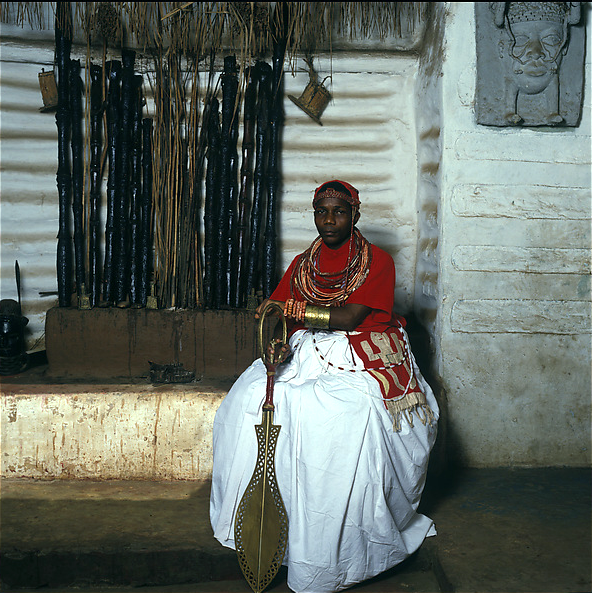
The announcement of the funeral rites of the late Oba of Benin, Omo N’Oba N’Edo Uku Akpolokpolo, Erediauwa II has once again thrown up the enigmatic nature of the Benin Monarchy. The world cannot help but be amazed at the elaborate nature and air of mystery that surround one of the world’s most preserved and respected kingships. Even when the Oba had passed on, no mortal was permitted to mention it until a formal announcement came out of the Benin Traditional Council.
In Benin City, all markets were closed for five days following the announcement. Throughout the duration of the Oba’s rites of passage which will be from May 25 to June 15, no burial or burial ceremony is permitted to take place within the Benin Kingdom.
Residents are advised to stay away from places where some of these traditional rites will be performed. However, the traditional council has assured that it will liaise with security agencies throughout the duration of the rites to ensure safety of lives and property.
Already, the crown prince who wears the title of Edaiken of Uselu has been coronated but he sits and holds court in his palace at Uselu and cannot take charge of the affairs of the palace until he is crowned as Oba. Even his crowning would be a tedious, elaborate, winding but colourful process. Prince Eheneden Erediauwa, any Benin man would tell you will be the next Oba but nobody can ascribe the title of Oba to him until his crowning rites are concluded.
A few years ago, our Editorial Team Lead, Kenneth Duru and Gloria Odia did an unusual excursion into the heart of Benin culture, traditions and the royalty. They interviewed one of the kingdom’s most important chiefs, the chief priest named Nosakhare Isekhure. Isekhure himself is a veritable enigma. He is obviously far from the normal run of men. He is an extra ordinary, baffling personality.
How else would any reporter explain the fact that the traditional Chief Priest of the Kingdom of Benin is an eminently educated man who holds two masters degrees from highly respected institutions in the world. Isekhure was educated in Switzerland, the Netherlands, Canada and the United States of America. Alas, the man whose enormous spiritual portfolio, includes divination even practised as a journalist.
Indeed, the journalist in Nosakhare Isekhure brings out the other amazing aspect of the Isekhure of Benin Kingdom (Isekhure is both his surname and official title). The man has maintained a considerable degree of openness. His candour and narrative skill are all so characteristic of a tested journalist. By the year 2008, he had spent 25 years as Chief Priest. We discovered then that those years spent in an uncommon traditional role had not killed the journalist in him. Read the full text of the interview reproduced below.
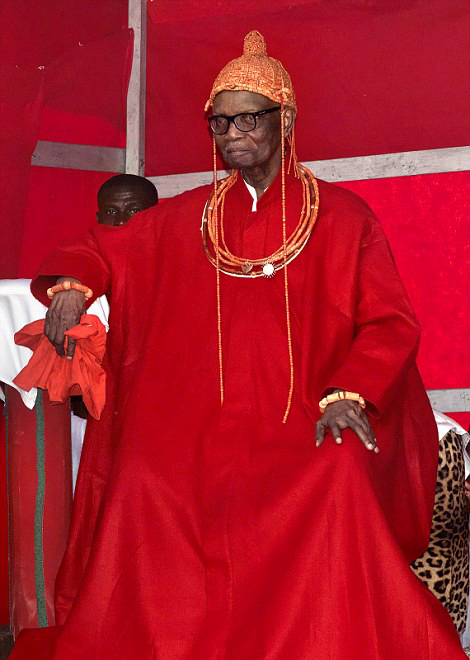
Tell us a bit about Nosakhare Isekhure?
I was born in 1950 into the family of Ugho Eguavoen Isekhure, who was the eldest son of Eguavoen Isekhure, the 30th Isekhure of Benin Kingdom. My father was the 31st Isekhure of Benin Kingdom. By the special grace of God, I am 32nd Isekhure of Benin Kingdom in the line of succession since 1255A A.D. This account is according to historical records. I had my primary education at St. Matthew’s Anglican Primary School, Benin and Benin Divisional Primary School, Benin. My secondary education was at St. Patrick’s Secondary Modern School, Benin. My tertiary education was done outside the country in several institutions including Franklin College, Lugano, Switzerland; British Institute, Naardeen Bussum, the Netherlands; Concordia University, Montreal, Canada and Century University, Beverly Hills, California, USA. I hold a Bachelor of Science degree (B.Sc) and a Master of Arts (M.A.) degree.
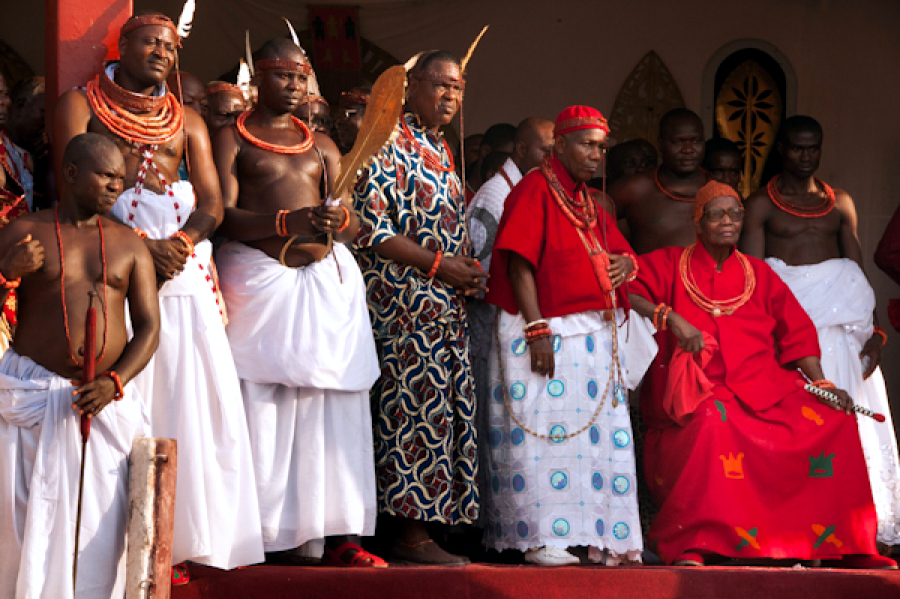
What was your youthful life like?
As a youth, I mingled freely with my peers. We were so much involved in cultural and musical activities. We were among the people who pioneered the art of miming and we also played versions of popular songs. Our group namely Edo Cultural Club was very active on the entertainment circuit then. We made use of improvised guitars and locally made instruments for out performances. We used to imitate the songs of such great musicians as Victor Olaiya, Emmanuel Teteh Mensah of Ghana, Zeal Onyia and Rex Jim Lawson. I was also a member of the Boys and Girls Club as well as the Ovonramwen Theatre. I took a break from my studies in Canada to attend the burial rites of my father in 1980. Afterwards, I went back to Canada and having completed my studies, I returned to Benin and was eventually installed as Isekhure in 1982. I did my National Youth Service with Radio Nigeria in Benin City. I served as the News Editor of the station for nine months. I worked with Radio Nigeria until 1984 when the military took over power. Afterwards, I worked as a member of the Board of Directors of the then Bendel Television and Radio Corporation for five years. I served the Gen. Babangida Administration as a member of the Constituent Assembly in Abuja in 1987. This committee, which was charged with the responsibility of drafting the constitution of the Federal Republic of Nigeria, lasted for nine months. In the same year, 1987, I also served as a member of the Board of Directors of the then Bendel Development and Properties Company (BDPC). I hold the honour of Justice of the Peace (JP) and the Fellowship of the Institute of Peace Studies. As a prolific writer, I have more than 300 articles in several newspapers and reputable journals. I have authored one book and co-authored more than three. I inherited the position of Chief Priest of Benin Kingdom by birth. The Benin tradition stipulates that once an Isekhure dies, his eldest son succeeds him. So, that was my case. However, the succession process is not just automatic or expressly done. The mantle does not just fall on the eldest son of any late Isekhure. The Oba has to ratify the choice. A new Isekhure is eventually installed after the performance of the rites of passage. Afterwards, the Oba confers the title officially on him in order to give the incumbent, the necessary legitimacy.
When exactly were you installed as the Chief Priest of Benin Kingdom?
My father passed on in 1980 and I was officially installed by the incumbent Oba of Benin in 1982. However before my official installation, I had to perform the Ikpuikpura meaning the final rites of coronation which were not performed by my late father. I had to perform the rites on his behalf before I could legitimately, by tradition, carry out his burial rites.
As Chief Priest, what are your functions and responsibilities?
First, as you can see, my house is not designed like the ordinary, conventional buildings. It is like a typical worship temple. It is where the Benin people come to offer prayers to God through our ancestors in the traditional way. It is a shrine which bears the relics and adornments of Bini ancestral worship. The shrine provides the avenue for the maintenance of spiritual authority and discipline within the kingdom. My major role as the Chief Priest, is to hold the fort for the Oba of Benin on spiritual matters. The Oba of Benin is of course, the spiritual head of the Edo nation. The Isekhure functions as the Chief Priest because the Oba himself cannot perform all the royal rites by himself alone. Instead, he (the Oba) delegates the authority to the Isekhure by issuing him with a staff of office known as Urhototo, which means the scarlet staff that no ordinary man can hold. As a member of the Bini royalty, it is my prerogative to offer prayers for the Oba of Benin and for the princes and princesses of the kingdom, the chiefs and titled men as well as every other individual who deserves to be prayed for at any point in time. As Isekhure of Benin, I perform the highest chieftaincy rites in the land. I administer all the traditional rites on all the chiefs of Benin Kingdom including the Oba himself. The Isekhure presides over all spiritual matters during the coronation of any Oba. This right is the exclusive prerogative of the Isekhure of Benin Kingdom. My late father performed the coronation rites for the incumbent Oba when he (the Oba) was Edaiken of Uselu preparatory to his final crowning. Since the Oba does not pray for an individual, every newly installed Benin chief is mandated to visit the Isekhure for prayers and traditional anointing. I personally anoint the Oba of Benin, while I delegate my fellow members of the Irhuogbe Royal Family to attend to other classes of chiefs. In addition to all these, there are some other functions performed by the Isekhure which I am not permitted by tradition to disclose. Those particular functions are shrouded in secrecy. They are part of our heritage which must be guarded and protected seriously. The Oba’s prayers pass through me to the people. I offer prayers and protection so that there could be peace in the kingdom.
You started out as a journalist and then you have a master’s degree. Why did you leave all that to become the Chief Priest?
It has to do with the uniqueness of our culture. The Bini customs and tradition are very strong. When you find yourself in such a position where everybody expects you to stand up for the very tradition within which you grew up regardless of your education or social status one can only follow suit. The scenario then was a kind of choice between making money and respecting the tradition of your people. Indeed, I have always been a strong believer in the promotion of the Bini culture. If my father were to be alive today and I had not become the Isekhure, perhaps, I would have made it big in the journalism profession. I could have made a lot of money. But I decided that if becoming the Isekhure is the price I have to pay for the sustenance and promotion of my people’s tradition and to ensure the continuity of the Isekhure office, then, so be it. I turned down the offer of a government appointment in order to concentrate fully on the office of Isekhure. I am someone who believes that if you want to demonstrate that something is very important, you have to do it yourself. We have a popular saying in Bini that if an Odionwere (the oldest man in the community) is asking for support to develop his community, he has to begin by placing his own money on the table before other people would then follow suit. If I, the custodian of the Bini culture, refuses, to become Isekhure because of the lure of wealth or the attractions of social glamour, who then would fit into that position? My belief is that God would repay me for the sacrifice I made by deciding to take up the Isekhure position at a very tender age. Truly, I make bold to say that today, God has indeed provided for me. The Bini culture is very special. It is very unique and crucial. We must clearly demonstrate that we believe in it, otherwise, Christianity would have eroded and rubbished our heritage. My long years of study abroad really made me to understand that the way the whites preach Christianity in Africa is not the way it is practised in their homeland. I belong to the class of people who maintain that we must protect our traditional heritage. Without our culture, we are a people without identity. We would not have anything to fall back on. It is like a situation where the tenants dictate to the landlord on how to manage a property. Christianity and Islam are alien to Africa. We are not saying that Christians and Muslims should not practise their faith. They should allow the traditional religion to exist and survive.
What is the relationship between you and the Oba?
The Isekhure must have the closest and most cordial relationship with the Oba. Any Isekhure is the Oba’s confidant. My case is not different with the incumbent Oba of Benin. Somebody who is holding a spiritual instrument in trust for the Oba must be a reliable person. His loyalty must not be in doubt. My father gave unfettered attention and support to the Omo N’Oba N’Edo during his coronation. So, as far as I am concerned, the story has not changed. I give myself to the service of the Oba. He (the Oba) spoke so glowingly about the cordial relationship that existed between him and my father in his recently published book. He reflected on the crucial role my father played throughout the coronation process. So, since my father passed on and the mantle fell on me, I cannot imagine myself performing less than he did. Naturally, I should improve on the achievements and activities of my father. It is even said that I am not as hot as my father used to be. But I believe that I am hot in my own special way. The fact that I attained sound education should be considered. If my father were to be alive today, he would not tolerate most of the anomalies going on in Benin today. He would have run the perpetrators down outright. But I am trying to bring a touch of moderation to the whole issue. My own style has a touch of modernity. So, I have absolute respect and regard for the Oba. I have an unbroken relationship with the Oba. I remain loyal to the Oba any day and any time.
How do you relate with the Oba beyond spiritual matters?
My relationship with the Oba is mostly spiritual. I offer prayers on his behalf. And when you talk about saying prayers it involves spirituality. It goes beyond just saying Haleluyah Amen. It entails the ability to see events as they unfold and the ability to forecast about the future. It involves the powers to prevent evil from happening. It helps to bring about activities that engender peace. The Isekhure ensures that protocol that sustain and promote the continuity of the Benin monarchy are observed to the letter. He ensures that the chiefs and other titled people are placed in their proper places. The Isekhure prays for God to protect the Oba and the entire kingdom so that we come out victorious from any battle we engage in. We offer sacrifices to ward off all forces of negativity in our land. Our prayers are of very great significance. They have aided the growth of Benin into a metropolitan city. We now have an influx of economic activities around the kingdom. All these were made possible because of the spiritual development, there would be peace. And again, a peaceful environment stimulates economic growth. Despite the maladministration we have had for some time, Benin City has been able to move on. We have a lot of economic prospects in the city today. We now have a high level of concentration of economic and industrial outfits. Indeed, Benin City has the highest concentration of banks and financial institutions after Lagos. There is also the Coca Cola factory in Benin City which is rated as the biggest in Africa, second only to the one in Canada. All these investments came to Benin City because of our spiritual status.
The Bini kingship and the kingdom have a lot of myths and mysteries. What is the Bini cosmology like?
We believe in Osanobua, the supreme god or Oghanosa, who is the creator of the world. The Bini believe that Osanabua created the earth. Afterwards, three or four other spiritual entities or beings came down to inhabit the earth. As they were making preparations for their journey down to the earth the king endowed each of them with certain properties to enable them exist. This was because then the earth was void and was filled with just water. One of the creatures descended with a bowl of wealth, the other one had a bundle filled with several kinds of minerals while last one came with a snail shell containing a piece of earth. Once they landed on earth they had no place to hang on to. Then, a certain local bird came and whispered to the last creature to pour out the contents of the snail shell. The creature obeyed the instruction and that was how the earth came into being. Afterwards, the other creature unleashed something that looked like a chameleon to test the suitability of the earth. The chameleon was meant to feel how solid the ground would be for habitation. That perhaps explains the nature of the chameleon to date. All the creatures agreed in unison to deposit all their wealth inside the earth with the exception of one of them. The one that rejected the idea came to be known as the goddess of the sea. She felt that she was very superior to the other creatures. She rather decided to deposit her wealth inside the water and she came to be known in Benin Kingdom as Olokun, meaning the goddess of the sea (river). The others are referred to as the gods and goddesses of the land. Mythically speaking, the being who deposited his wealth in the land is seen as the progenitor of the Benin Kingdom. It is believed the Oba of Benin has his ancestry from that lineage. It is regarded as the beginning of the Benin kingship. The kingship chain started form the Sky King (Bini mythology) and later developed into the Ogiso kingship system.
When exactly did the Obaship start?
It started way back about 1,000 years ago. Judging from historical accounts and records, it has lasted over one thousand years from when the first Oba namely Oba Eweka was coronated. The Oba’s lineage has run without any break till the present day. The succession system is passed on from father to son.
What do you say about the popular version of the history of Benin and the ‘authentic’ Edo version? What does the oracle say about the Obaship as recently alluded to by Oba Erediauwa in his book?
There are no two ways about it. The Omo N’Oba N’Edo’s version is the most authentic. It is the one that is logical. It is the one that is traceable and can be supported with facts and historical evidence. The Oba of Benin’s account talks about a certain man named Ekaladerhan, who was a Bini prince. He was the only child of King Owodo, who was the last of the Ogisos. Owodo was worried about the fact that her retinue of wives could not bear her children. He decided to unravel the cause of the barrenness in his palace. The oracle was consulted and it was actually revealed that Isagho, the most senior wife of the king was the culprit. However, by a stroke of her mischievous nature, Isagho induced the Chief Priest to lie to King Owodo that Ekaladerhan saw her (Isagho’s) nakedness. The king accepted the report and pronounced that Ekaladerhan be sacrificed as a punishment for the taboo. He was to be executed at a place called Ughokhokho. Bu the truth of the matter was that the oracle did not pass a death verdict on Ekaladerhan. However, luckily for him, Ekaladerhan escaped and fled to Uhe which I suppose is the same place that is referred to as Ife in Yorubaland. Interestingly, the people around Uhe had been informed by the oracle that a man was coming from the East and that the man would be their ruler. And this account tallies with the most accurate historical record. Ekaladerhan, the Bini prince, was well endowed with good looks befitting of the son of a king. So, the people around Uhe embraced him and in no time, his personality became so venerable. Bini oral tradition used to refer to Ekaladerhan as Oghene N’Uhe. He was crowned as Izoduwa which is probably corrupted into Oduduwa by the Yoruba. Izoduwa means “I found a part of prosperity.” Here was a man who had a death sentence hanging on him coming face to face with wealth and being crowned as a king. He became so happy that he decided to settle there. However, in no time, news of Ekaladerhan’s new-found status spread to Benin. The Oba implored him to return home. But Ekaladerhan blatantly refused to accede to the Oba’s entreaties. Later on, the king sent a group of people from the royal family to go and bring him back to Benin. The people got there, pleaded with him and even stayed with him to see if he could change his mind, but he remained adamant. However, Ekaladerhan later sent his son named Omonoyan instead to go with the emissaries from Benin. It was people from the Urogbe royal lineage (which is where I also belong) who brought Omonoyan to Benin. I suppose that it was Omonoyan that the Yoruba refer to as Oranmiyan. Right here in Benin, we have all the original artifacts, relics and other items which Omonoyan brought from Uhe to Bini kingdom. They are all very much intact in our archives. We have a documented record of all the places and the routes Omonoyan passed through, and the places he visited before he eventually arrived Benin. Our own account of the whole thing is not based on imagination or imaginary history. We have proof and evidence to support our claims and stand on the entire issue. It is pertinent for me to make the point clear that the issue is not actually about whether the Yoruba people came from Benin or the other way round. Our argument is that origin of the Yoruba kingship has a correlation with an event that happened in Bin Kingdom. They claim that Oduduwa came from the sky. This is not possible in the human concept. None of the great men in history including Jesus Christ and Mohammed are said to have come from the sky. When the Oba of Benin came up with his book, it drew a lot of criticisms especially from the Yoruba people. But when I wrote a rejoinder, which set the facts straight, I threw a challenge to them which they have not been able to contend with. I think the contents of the rejoinder I wrote laid the matter to rest. Our stand is based on historical analysis backed with traceable facts and evidence, and not mere hearsay or conjecture.
What is the relationship between the Bini, Ife and Oyo?
We always see them as our brothers. We are related historically. Oranmiyan (Omonoyan), who is the progenitor of these kingdoms, was of Bini ancestry. Oranmiyan could not stay in Benin because he could not quickly adapt to the lifestyle of the people. This could be because he was not born in Benin. However, before he left he had an affair with the daughter of a Bini Chief namely Ogiegor. She got pregnant and gave birth to a baby boy namely Eweka, who was later crowned as Oba Eweka 1. It was when Oranmiyan left Benin that he went on to found Oyo and the Alafin kingship. There is a strong interrelationship between the Benin, Oyo and Ife. In Benin Kingdom today, we have the Ododuwa festival which reflects the historical link between the Bini and the Yoruba people.
Which are the kingdoms who owe traditional allegiance to the Oba of Benin? For instance, which kings are crowned by the Oba of Benin?
The first Oba of Lagos was crowned by the Oba of Benin. The Ashipa ruling house has a Bini ancestry. In those days, the Benin Kingdom had territorial authority over Lagos and even up to Dahomey. Most of the royalties in these areas had direct relationships with the Benin Kingdom. The Awujale of Ijebu-Ode has a Bini ancestry. The kings of Owo, Ado-Ekiti, all have roots in Benin. The Olu of Itsekiri is a direct descendant of the Oba of Benin. Indeed, almost all the monarchs in present day Delta State are installed by the Oba of Benin. The influence of the Oba of Benin is reflected even up to Onitsha and some of the Igbo speaking areas. The Onitsha monarchy has a lot in common with the Bini tradition.
Do you mean that the Oba of Benin crowns the Obi of Onitsha?
In the olden days, Onitsha area and its environs were under the authority of the Oba of Benin. Even till today, you find that the royal scepter of the Obi of Onitsha looks exactly like the one we have in Benin. Indeed, any royalty that holds that kind of scepter must have had a linkage with the Benin Kingdom. It is very symbolic. It is the instrument of power and the centre of authority of the Benin monarchy. Such royalties as the Obi of Agbor, the Obi of Ubulu Uku and the rest trace their ancestry to Benin Kingdom. Recently, an Isoko community in the Sagbama Local Governemnt Area of Bayelsa State came to the Oba of Benin asking him to come and crown their king. I was among the five chiefs delegated to carry out the assignment. Aside from all recently retracing their ancestry to the Benin Kingdom. All these go to show that the Benin kingship and kingdom have really come a long way.
What is the relationship between the Bini and the Esan?
Esan people have their roots in Benin. They are originally Bini. We refer to them as Esanlaha. Even till today, most of the Esan dukes and title holders are installed by the Oba of Benin. They derive their royal authority from Benin Kingdom. The people who founded what is today known as Esanland came from Benin. They were a set of people who were supposed to fight under the army of Oba Esigie, the then Oba of Benin. Instead of going to the battle field they fled and dispersed far into the forest. They refused to return to their native home. Most of them were from the Uselu Quarters in Benin. The word, ‘Esan’ is derived from the Bini expression Esanlaha, meaning those who jumped into the bush. The authentic account of the origin of Esanland is documented in the book written by Dr Clifford Okojie. The difference you find between Esan language and Edo language is very small. Those fleeing warriors decided to change the way they spoke the language to avoid being identified and to avoid being taken back to Benin to face the punishment for their mis-indeed.
What is the place of the word, “Esangbedo in all this?
It implies that the Esan cannot fight the Edo. It means that the Esan are like an offspring of the Edo. The relationship is like that between a senior and a junior.
Is it true that the Edaiken of Uselu, the Crown Prince of the Benin Kingdom does not behold the face of his father?
That is not true! It is a blatant lie. It is obviously one of those old myths and misconceptions about the Benin Kingdom. The Crown Prince goes to see his father any time he likes. He goes to see the Oba every day.
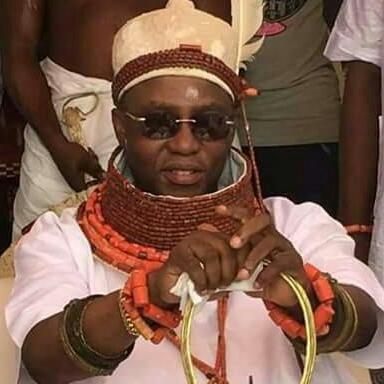
Tell us about the Holy Aruosa. We hear it is the church of the royal family. Is this true?
The Holy Aruosa was established when the Portuguese first came to Benin. They were the first people to bring Christianity to Nigeria. The people of Benin found their kind of worship very strange and alien to their indigenous tradition. Notwithstanding the challenges, the Portuguese missionaries made spirited efforts to win converts but their success was very minimal. However, the reigning Oba of Benin allowed them to carry on their activities and even gave them portions of land to build churches. As time went on, Oba Esigie had a kind of agreement with the Portuguese missionaries. The king sent an ambassador and a team of Bini chiefs to go and study the religion in its original form in Portugal. Afterwards, they returned to Benin and the church was set up at different locations in Benin although the activities of the Holy Aruosa Church were not quite popular then. When Oba Akenzua came to the throne, the saw the need to fashion the church in line with the Bini traditional style of worship. It was he, Oba Akenzua, who built the first Holy Aruosa Cathedral in Benin. Although the cathedral he built was similar to the conventional Western church building, the mode and method of worship was entirely different. It was Oba Akenzua who resuscitated the Bini traditional style of worship in the Holy Aruosa Church. Today, at the Holy Aruosa Cathedral, we pray directly to God and not through intermediaries. Instead of preaching sermons on characters from the Bible like St. Peter and St. Paul, we talk about Osagbaiye and other Bini deities who played significant roles in the survival and continued existence of the Benin Kingdom. We have 201 deities and divinities in our land which we pray to. The language of worship in the Holy Aruosa today is the indigenous Bini language. We pray and call on God Almighty in our native ways and tradition.
Who presides over a typical worship session in the Holy Aruosa church?
The duty can be performed by anybody. The Oba of Benin goes there in his capacity as the spiritual head of the Edo nation. The church does not actually belong to him as a person. Although he is the head of the church, every other person has the right to worship in the church at any time. We do not speak English language right inside the church. The Holy Aruosa used to have branches in Enugu and Onitsha. But the activities of the church in these places have waned since the outbreak of the Nigerian civil war. The major point of our preaching in the Holy Aruosa is that God manifests himself to all and sundry through diverse ways. Therefore, one has to pray and worship him according to the dictates of their indigenous community.
How did the Portuguese react to the prominence of the Holy Aruosa Church in Benin?
The Portuguese did not have any problems with us. They went ahead to preach and spread the Catholic faith while the Bini people practiced the Holy Aruosa in their own native way. The Holy Aruosa received severe criticism only when the British people came with their Anglican faith. They particularly kicked against the playing of tradition musical instruments like gongs and maracas in the church. They saw the instruments as fit only for idol worship. But today the playing of music with local instruments has become the vogue. It all started from the Holy Aruosa. The Holy Aruosa was the first to introduce the use of gongs and other traditional musical instruments to church worship. Oba Akenzua stood firmly against the British critics of the Holy Aruosa style of worship. He challenged the British to produce facts to prove that God answers prayers only through one language. He maintained that in the absence of any proof he would remain firm in his worship with the Bini language and through the indigenous tradition.
Do you make use of the Holy Bible in the Holy Aruosa church?
No, we do not. We have what we call a sacred creed which directs our worship in relation to life and living; crime and punishment and all that.
Does the Oba of Benin attend any other church?
Indeed, the Oba is the head of all churches including the Catholic and Anglican. He is at liberty to attend any of the churches any time and any day. However, the Oba does not attend church just like any ordinary man does. He attends church when occasion demands for it. There is no inhibition to the choice of the Oba concerning churches.
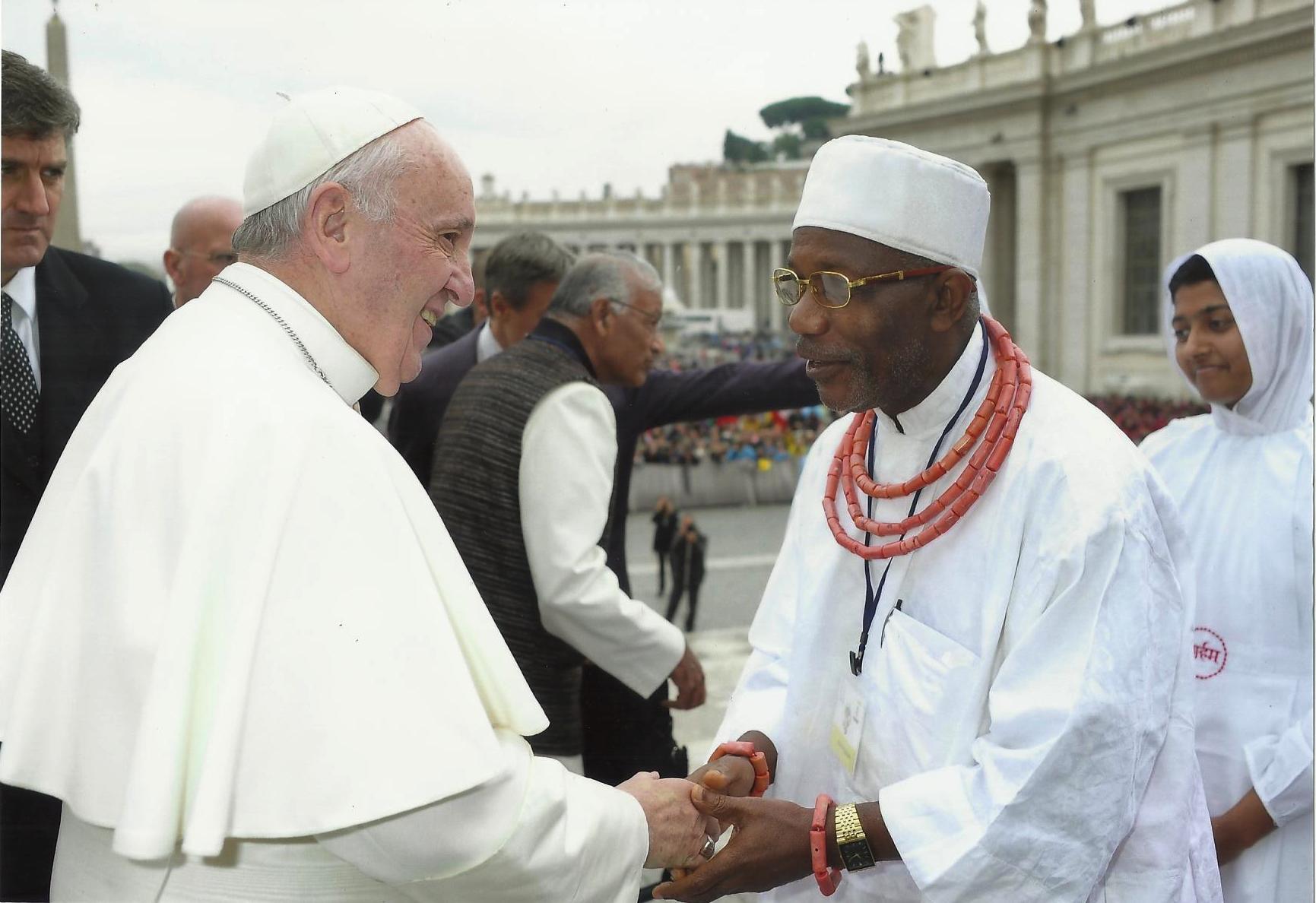
Generally, what are the dos and don’ts of a Benin Oba? What are the things he must not do as a matter of tradition?
The Oba of Benin is the owner of taboos. The Oba does not visit anybody’s house. It is forbidden for the Oba to shake hands with anybody. The Oba must not fail to perform the rites which tradition has vested on him. The Oba does not go back on his words. His words are his bond. He must not revoke any of his pronouncements. The Oba has the duty to listen to all his subjects irrespective of their age, class or social status. As the leader of the people, the Oba shows the way. He leads by example.
How does an Oba marry for instance? Is it like when he points his finger, the maiden must be brought to him?
That may have been the case in the olden days. But today, the story is different. The incumbent Oba of Benin is a very dynamic and refined man. The Oba has the right to admire any lady. He does not force anyone into marriage.
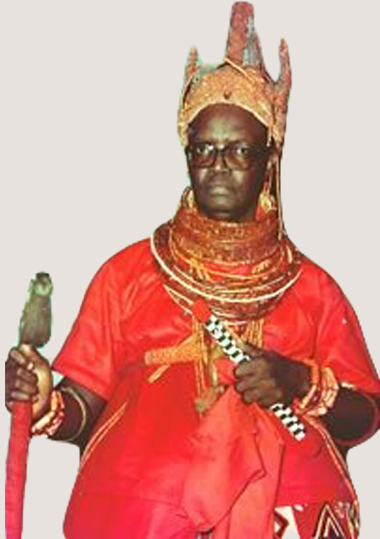
What is the role of the Dukes of Benin?
They are like miniature Obas in the various quarters and villages that make up the Benin Kingdom. They are the direct representatives of the Oba of Benin in these places. In the olden days, some of them had very fearful authority. Some of the Dukes are appointed directly from the royal lineage while some are appointed because of their military prowess. The Dukes hold court in their respective domains. However, they refer some critical cases to the Oba of Benin to adjudicate on.
Is it true that the Oba of Benin does not give chieftaincy titles to people from outside the kingdom?
That is not true! The Oba can give honour to people who may not be indigenes of Benin Kingdom. The Oba can confer a chieftaincy title on a foreigner, who has willingly accepted to serve in the Benin territory. There are some non-indigenes of Benin Kingdom who have been give titles by the Oba of Benin. These include the likes of the late Sir Felix Okotie-Eboh, who was given a title by the late Oba Akenzua. We confer titles only on people who would be willing to use the title to serve the interest of the Bini people. We do not have honorary titles in Benin.
What qualifies anybody for a Chieftaincy title in Benin Kingdom?
The person has to be honest, dedicated and ready to defend the Oba and the integrity of the Benin Kingdom anywhere and any day. However, before any step is taken in this direction, the Oba of Benin has to verify the sincerity and strength of character of any intending chief. He has to be scrutinized properly because the Bini chieftaincy title goes with a lot of demands. For instance, the chiefs have to be present at the palace from time to time to listen to cases and mediate on matters concerning the administration of the kingdom.
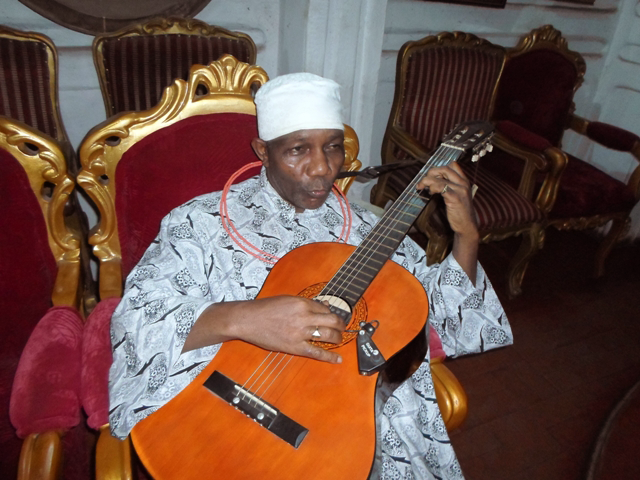

Boston Museum Returns Two Benin Bronzes Back To Nigeria
Ex-Governor Ladoja Crowned 44ᵗʰ Olubadan Of Ibadanland In Historic Ceremony
Senator Rashidi Ladoja Nominated As 44th Olubadan Of Ibadanland
Awujale Of Ijebuland, Oba Sikiru Adetona, Dies At 91